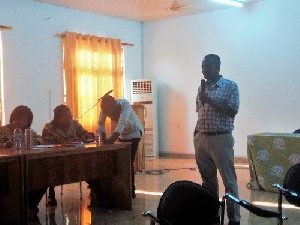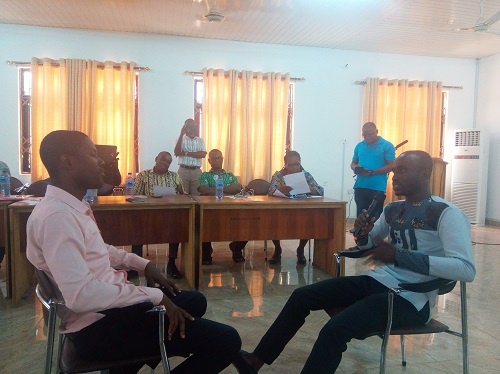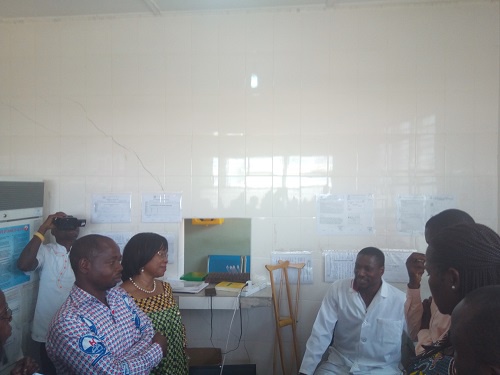 Dr. Abraham Oduro, Director of the NHRC
Dr. Abraham Oduro, Director of the NHRC
Mosquitoes have been named as ‘solely’ responsible for the withdrawal of a bold plan that could have seen Ghana and her West African siblings become just like South Africa or Zimbabwe, where people from multiracial backgrounds live together as a nation.
The white colonial powers, after giving independence to the West African countries in the 20th century, yearned to stay back in the sub-region to live among the blacks as seen today in some parts of Africa, but the dread of malaria-carrying mosquitoes sent them packing before that plan was executed.
The Director of the Navrongo Health Research Centre (NHRC), Dr. Abraham Rexford Oduro, touched on this Tuesday at a training workshop organised on malaria for media practitioners in the Upper East region by the African Media and Malaria Research Network (AMMREN) in partnership with the NHRC and the Ghana Health Service (GHS).
He did not claim that the sub-region could have been in a more desirable state today or otherwise if anopheliphobia (the fear of mosquito) had not urged the departure of the alarmed whites. Dr. Oduro did not state either as to why the colonial masters, after the maiden independence ceremonies, had longed to cling to their former colonies.
But by disclosing why they had to leave, he inspired participants to ponder over the ‘silent harm’ malaria, like terrorism, could be doing to local tourism today in all corners of the country: unnerving prospective tourists. By disclosing why they had to abandon that plan, he highlighted the need for stakeholders to do more than was being done to stop malaria from killing more Africans in their natural home in the 21st century.
“Malaria is the largest killer of kids in our time. It’s because of malaria that our sub-region was not colonised. It’s because of malaria that West Africa was not colonised. The whites couldn’t survive. They could survive in Zimbabwe and South Africa because there was no malaria. Malaria chased them out.
“Before we reached this stage, malaria used to kill a lot. But now, we have been able to contain the malaria. As we have been able to take care of the quantity, we [also] need to take care of the quality [by ensuring that] we do not only treat but to treat and treat well so that we can know that there is improvement,” said Dr. Oduro.
The one-day workshop, themed “The Role of the Media in Strengthening the Quality of Malaria Care and Surveillance in Ghanaian Communities”, brought together media personnel, staff of the NHRC, AMMREN officials and representatives from the GHS.

Fake Drugs ‘immortalising’ Malaria Parasites
According to Dr. Thomas Anyorigiya, an NHRC research fellow, at least 216 million malaria cases are recorded every year around the globe with about 445,000 people, including very promising children, dying from the disease.
A distressing 90% of those cases, he said, happen in Africa also 12-monthly. And over 33% of the Out-Patients Department (OPD) attendances in Ghana are linked to malaria.
Dr. Anyorigiya mentioned the emergence of fake antimalarial drugs in Asia and poor human behaviour towards malaria treatment in Ghana as threats that should be considered serious to the campaign being waged against the disease in the country.
“Whilst we have recommendation as to how we should take treatment when we fall sick, somehow we fail to adhere to treatment protocol. By so doing, we are exposing the parasites to what we call low doses of the drug, and because of that they (the malaria parasites) are able to build resistance. And once they build resistance, you will take the medication, it won’t go. Currently, we have deployed the best of antimalarial treatment across the world.
“But as we speak now, the issue of substandard drugs is also a problem. We have drugs emanating from Asia and they come to Africa. So, currently, whilst we say that artesunate is working well, we’ve already got reports of resistance [to artesunate] in Southeast Asia. Most of the time we have talked about drug resistance, that’s where it starts from and comes all the way to Africa. That is the reason we lost chloroquine. We’ve introduced this one and we’re beginning to see signs of resistance,” said Dr. Anyorigiya, who added that a Short Message Service (SMS) system had been put in place to help decode genuine and fake antimalarial drugs.

Unsuspected Mosquito Factories
Reappearance of malaria mosquitoes, soon after every drain has been cleaned and all the bushes around cleared, is an issue that keeps baffling the public— and which is why some think getting rid of the mosquitoes around them is not worth the stress.
It was a mystery to which some of the participants had, until Tuesday, been seeking some explanation. And experts engaged at the workshop provided an answer as they shed light on it. The mosquitoes that cause malaria do not breed in dirty water. They do so in any clean water in a container left uncovered at the least unlikely places— including kitchens where containers holding clean water are, as a rule, left open in some homes.
Whilst making a presentation at the programme on some malaria control interventions being implemented in the region, the Upper East Regional Malaria Focal Person, Sydney Abilba Ageyomah, bemoaned a disappointing usage of insecticide-treated mosquito nets in the region.
“Even though we have data to back up the fact that Upper East is one of the regions that have high availability of—that is, access to— bed nets within Ghana, the usage is a very big challenge. Most of us have the bed nets, but how many of us sleep under them? It’s important, the media can also help us in this aspect. Owning a bed net is not enough; it’s important that you sleep under it to prevent yourself from getting malaria,” Mr. Abilba stressed.
AMMREN unveils Project; tasks Media to join Campaign
The workshop also saw organisers unveil a project that AMMREN intends to carry out in the region as part of its antimalarial campaign agenda.
The project is scheduled to set off with a baseline survey and afterwards will offer some interventions which will, among other things, include public education and training of malaria care providers to “diagnose malaria appropriately” using “the current protocol on testing, treating and tracking malaria cases”.
Media guru and AMMREN’s Convener, Dr. Charity Binka, tasked participants to support the malaria control campaign through “news coverage, special documentaries, featured articles, exclusive interviews, radio programmes, active engagement with malaria researchers, fieldtrips for firsthand information gathering and engagement in World Malaria Day activities”.
“We believe that the journalists have a very important role to play in getting the malaria story across, that if we want malaria to be eliminated in our time, we have a key role to play. We can amplify the voices of the people and the voices of the researchers. The mosquito is not a problem. The problem is us— we who are not able to do what we are supposed to do,” Dr. Binka remarked.